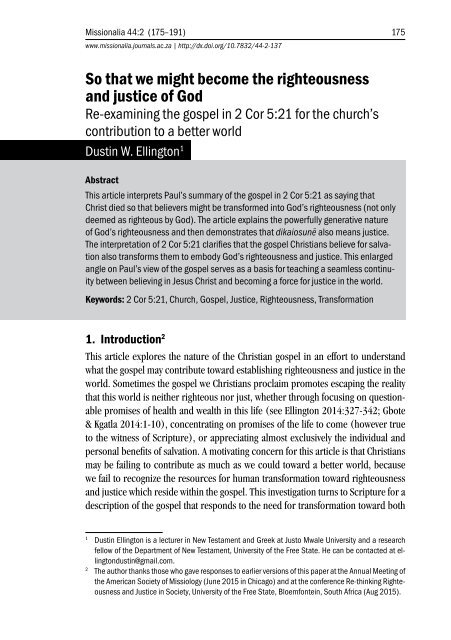Acquiesce to Righteousness
Acquiesce to Righteousness
Acquiesce to Righteousness
You also want an ePaper? Increase the reach of your titles
YUMPU automatically turns print PDFs into web optimized ePapers that Google loves.
Missionalia 44:2 (175–191)175<br />
www.missionalia.journals.ac.za | http://dx.doi.org/10.7832/44-2-137<br />
So that we might become the righteousness<br />
and justice of God<br />
Re-examining the gospel in 2 Cor 5:21 for the church’s<br />
contribution <strong>to</strong> a better world<br />
Dustin W. Elling<strong>to</strong>n 1<br />
Abstract<br />
This article interprets Paul’s summary of the gospel in 2 Cor 5:21 as saying that<br />
Christ died so that believers might be transformed in<strong>to</strong> God’s righteousness (not only<br />
deemed as righteous by God). The article explains the powerfully generative nature<br />
of God’s righteousness and then demonstrates that dikaiosunē also means justice.<br />
The interpretation of 2 Cor 5:21 clarifies that the gospel Christians believe for salvation<br />
also transforms them <strong>to</strong> embody God’s righteousness and justice. This enlarged<br />
angle on Paul’s view of the gospel serves as a basis for teaching a seamless continuity<br />
between believing in Jesus Christ and becoming a force for justice in the world.<br />
Keywords: 2 Cor 5:21, Church, Gospel, Justice, <strong>Righteousness</strong>, Transformation<br />
1. Introduction 2<br />
This article explores the nature of the Christian gospel in an effort <strong>to</strong> understand<br />
what the gospel may contribute <strong>to</strong>ward establishing righteousness and justice in the<br />
world. Sometimes the gospel we Christians proclaim promotes escaping the reality<br />
that this world is neither righteous nor just, whether through focusing on questionable<br />
promises of health and wealth in this life (see Elling<strong>to</strong>n 2014:327-342; Gbote<br />
& Kgatla 2014:1-10), concentrating on promises of the life <strong>to</strong> come (however true<br />
<strong>to</strong> the witness of Scripture), or appreciating almost exclusively the individual and<br />
personal benefits of salvation. A motivating concern for this article is that Christians<br />
may be failing <strong>to</strong> contribute as much as we could <strong>to</strong>ward a better world, because<br />
we fail <strong>to</strong> recognize the resources for human transformation <strong>to</strong>ward righteousness<br />
and justice which reside within the gospel. This investigation turns <strong>to</strong> Scripture for a<br />
description of the gospel that responds <strong>to</strong> the need for transformation <strong>to</strong>ward both<br />
1<br />
Dustin Elling<strong>to</strong>n is a lecturer in New Testament and Greek at Jus<strong>to</strong> Mwale University and a research<br />
fellow of the Department of New Testament, University of the Free State. He can be contacted at elling<strong>to</strong>ndustin@gmail.com.<br />
2<br />
The author thanks those who gave responses <strong>to</strong> earlier versions of this paper at the Annual Meeting of<br />
the American Society of Missiology (June 2015 in Chicago) and at the conference Re-thinking <strong>Righteousness</strong><br />
and Justice in Society, University of the Free State, Bloemfontein, South Africa (Aug 2015).

















